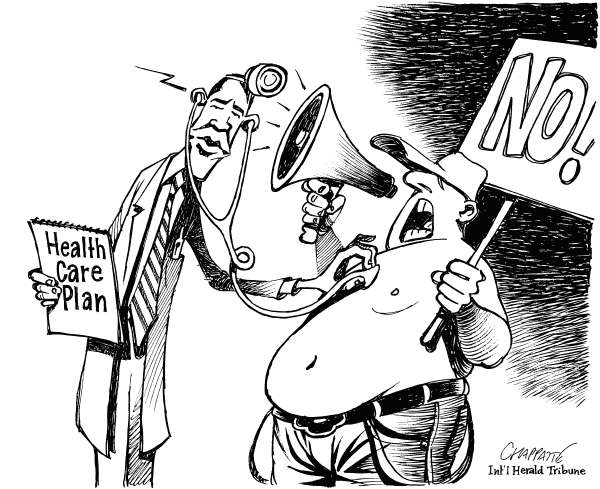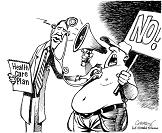
The Affordable Care Act. Obamacare. No words have been able to drive a division in our politics more than these words. The Affordable Care Act was officially passed by Congress and signed into law by the President in 2010, so this is now the health care system we all live under as Americans. What is it about the ACA or Obamacare that triggers such divisiveness and polarization in our politics and who has the high moral ground?
Health care in the US has long been a tale of two competing factors:
- The most advanced health care in the world where the world's premier health care providers and research scientists provide the best care.
- The most expensive health care in the world where many are shut out from receiving the best care if they don't have the means to pay for it.
For many years, the government (either state or Federal) provided health care for the elderly and disabled, but most others got their health insurance through their employer as part of the benefits plan companies offered to their employees. Employer-based health coverage worked well when everyone worked for the same company from their mid 20s all the way to retirement. However, the world changed and people rarely spend their whole careers with the same company. As we moved through the 1990s and 2000s more and more Americans found themselves uninsured or underinsured and would be one catastrophic illness away from financial ruin. In addition, costs for health care in the US were skyrocketing and threatening to make Medicare run out of money before long.
Many states devised their own programs to cover its uninsured population. In 2006 Massachusetts governor Mitt Romney worked with the Massachusetts state legislature to pass a bill that would reform health care with the goal of getting 95% of its residents covered in 3 years. This plan relies on 3 basic principles:
- Patients with pre-existing health conditions cannot be denied health coverage, and similarly cannot be dropped from a health plan if they get sick.
- Everyone must obtain health insurance. This is the individual mandate. Those who don't sign up for private insurance will have to pay a penalty.
- Those who cannot afford health coverage will be subsidized by the state.
Health care reform became a top priority for the Obama administration in his first year in office. Despite the deepening recession and the worst financial crisis since the Great Depression, Obama put it to his leaders and the Democratic majorities in both houses of Congress to make health care reform happen. Republicans, on the other hand, would have none of it. There may have been some glimmer of cooperation between Democrats and Republicans at the start of the process, but by the time the health care bill took shape, every Republican was against it. As mentioned, the bill was modelled after the one implemented in Massachusetts and built around the idea of an individual mandate. People would be incentivized (or some would say forced to) buy health insurance but they'd buy it on the private market. The idea of a "public option" was floated. This would be an option for people to choose a health insurance plan run by the government instead of on the private market. For reasons not totally clear, the public option didn't make it into the final bill which became known as Obamacare.
It was about the time that the final bill was taking shape in August of 2009 that the Tea Party began to emerge as a force in American politics. Fueled by its hatred of Obamacare, ultra right wing Tea Party members interrupted and shouted down Congressmen as they tried to explain Obamacare it their constituents during the August recess. The Tea Party put such a scare into Republicans that if anyone was thinking of working with the Democrats and Obama on health care they soon thought better of it. The right wing portrayed Obamacare as socialized medicine where everyone's premiums would skyrocket and people would lose the coverage they already had. The text of the original bill specified coverage for end of life counseling, and the right wing turned that into a crusade against the "death panels" of Obamacare. As 2009 came to a close, it was clear that the country was split on health care reform.
Obama's mandate after the 2008 election was unprecedented in that Democrats had a majority in the House and 60 votes in the Senate, providing a filibuster-proof majority in the Senate. However, for Obamacare to pass both houses, they needed to unify just about all of the Democrats because not one Republican would support it. This meant compromises upon compromises to produce a bill that would be supported by middle of the road Democrats and very liberal Democrats.
On November 7, 2009 the House of Representatives passed its version of health care reform by a 220-215 vote. There was one Republican that voted for it, Congressman Joseph Cao from Louisiana. The rest of the votes came from Democrats. On December 24, the Senate passed its version of the bill by a 60-39 vote, needing every last Democratic vote to overcome a Republican filibuster. As is customary in Congress, the bills would now be reconciled in a conference committee and the two bodies would vote again on the compromise between the House and the Senate. The country continued to be split mostly by party affiliation, and the right wing promised to do everything in its power to stop Obamacare from becoming law.
In January of 2010 a special election was held in Massachusetts to fill the Senate seat of Edward Kennedy who had recently passed away. In a surprise result, Republican Scott Brown won the special election in usually Democratic Massachusetts. Scott Brown had actively campaigned against Obamacare, and it was clear now that the 60 vote filibuster-proof margin in the Senate was gone. Another vote on a compromise bill between the House and the Senate would not be possible now that Scott Brown was the 41st Republican which left the Democrats one vote short of the ability to defeat a Republican filibuster. For this reason, the House had to vote on and pass the Senate bill unchanged. This is exactly what happened. On March 21, 2010 the House passed the Affordable Care Act unchanged from the Senate version, and Obama signed it two days later. The Affordable Care Act was now law, even though Republicans vowed to repeal the law as soon as possible. They claimed that the country was against it and it was being forced on the people against their will.
The Affordable Care Act would be renamed in the public's eye as Obamacare. Obamacare has many provisions and most of them would not go into effect for a few years. Republicans, on the strength of a growing Tea Party movement who was militantly against the Affordable Care Act, won a big victory in the 2010 midterm elections and took over the House of Representatives. Once in power, Republicans staged vote after vote to repeal Obamacare, knowing that the Senate, still controlled by Democrats, would not vote for the repeal and Obama would of course veto it. Republicans now promised to stop the law from being implemented either by defunding it or by supporting court challenges that could overturn parts of the law.
The first major threat to Obamacare through the courts came in 2012. A lawsuit filed by 26 states claimed that parts of Obamacare including the individual mandate were unconstitutional, and this challenge went all the way to the Supreme Court. If the court struck down the individual mandate that everyone needed to have health insurance, the law would unravel because nothing would compel young and healthy individuals to buy insurance so rates would skyrocket as insurance companies would only be insuring injured and sick people. Given the composition of the court, the right had high hopes for the court to strike down the individual mandate part of the law which would make it unworkable. In a surprise decision on June 28, 2012, conservative Chief Justice John Roberts voted with the liberals on the court upholding the law. Conservatives on the court argued that forcing individuals to buy health insurance was unconstitutional, Roberts and the 4 other liberals on the court ruled that the individual mandate amounted to a tax on individuals (who refused to purchase health insurance), and a tax is certainly constitutional. The Supreme Court also ruled that states did not have to participate in the federally funded Medicaid program to provide insurance for their very poor who wouldn't be able to afford insurance. This meant that states controlled by Republicans could opt out of the Medicaid program even though the federal government paid for almost all of the costs in the first few years.
The election of 2012 featured President Obama going up against Mitt Romney who became the Republican's nominee. Mitt Romney, doesn't that name sound familiar? He was the one who pushed through the Massachusetts health care law that the Affordable Care Act was modelled after. Awkward! Now Romney had to campaign as the leader of the party who vowed to repeal Obamacare as soon as he got the chance. Romney tried to explain the apparent contradiction by arguing that the Massachusetts law was right for Massachusetts, but wrong for the rest of the country. The election in 2012 was in large part about Obamacare, and in the end Obama won the election by a large margin. Election pundits interpreted the election result as a positive for the Affordable Care Act as it stood as Obama's signature achievement in his first term and the people had re-elected him. Republicans continued to claim that it was a plan the people didn't want and they continued to vow to stop it from being implemented.
As 2013 approached, Obamacare would have its toughest tests. The main part of the rollout would occur in late 2013 as the millions of uninsured individuals and families would have the opportunity to enroll for health insurance for the year 2014. The war of words continued between Democrats and Republicans. Democrats predicted millions would enroll as soon as it was available, and the problem of the uninsured and out of control healthcare costs would be solved. Republicans predicted insurance premiums would skyrocket and people would be thrown off of their perfectly good health plans. Obama famously promised that if you like your health plan, you can keep it.
Meanwhile, Republicans in Congress held vote after vote to repeal Obamacare. By late 2013 they'd held something like 40 votes to repeal key provisions of the law, knowing they'd never become law because of course the President would never sign a law repealing his signature achievement. In October, Republicans led by Senator Ted Cruz and a number of conservative House members engaged in a new tactic - they'd refuse to pass a budget unless funding for Obamacare were eliminated. The House, controlled by Republicans, passed such a budget but the Democratically controlled Senate refused. By October 1, there was no budget agreement to fund the government. Over 800,000 workers in various government agencies could not be paid and were furloughed. Many government services were shut down during this period, but essential services like air traffic control and homeland security workers continue on the job. Republicans made claims that the country was on their side but as the shutdown went on it became clear that their tactic did not have public support. After 16 days, Congress agreed to end the shutdown with funding for Obamacare fully intact. Cruz and House Republicans essentially got nothing except the embarrassment of putting 800,000 people out of work for 16 days.
During this same period in October, the online system for enrolling new members into health care plans was opened. It was a disaster. People who previously could not obtain affordable health insurance could now shop around on the government's website for a plan to suit their needs. Problem was, the website didn't work. Widespread outages and crashes on the website coupled with confusing forms to fill out frustrated consumers. Obama had set a goal of 7 million new enrollments in the first open enrollment period but for the first month no one could successfully get through the enrollment process. Later on it was discovered that many individuals who had inexpensive health plans could no longer obtain the same plan because it no longer met the minimum standard, so they'd be forced to enroll in a more expensive plan. Obama's promise of "if you like your current plan you can keep it" was played over and over in right wing media.
Fortunately for the Obama administration, as the open enrollment period went on the engineers fixed the website, and consumers were given support to find an appropriate health plan. By April, 2014 over 8 million people had enrolled in an a qualified health care plan. Despite the botched rollout of the website and Republican efforts to defund the program, Obamacare had survived.
One more court challenge to Obamacare would occur in 2015. Conservatives desperately trying
to stop Obamacare in any way possible exploited a poorly drafted section of the law to bring a lawsuit that would again end up in the Supreme Court. Buried within thousands of pages of the Affordable Care Act was the statement that subsidies would be available to consumers in exchanges "established by the state". As it turned out, 34 of the 50 states did not establish their own exchanges and relied on the federal government to establish health care exchanges. The lawsuit claimed that consumers in these 34 states were not eligible for subsidies. Supporters of the law claimed that the intent was obvious - anyone who enrolled in a health care plan and qualified for a subsidy could receive one, not just those who were part of state exchanges. Opponents of the law and supporters of the lawsuit knew that millions of consumers would not be able to afford health care without the subsidies but it would be worth it to unravel the law. On June 25, 2015 the Supreme Court issued a 6-3 decision again upholding the law and denying Obamacare opponents of a path the kill it. Again the majority decision was written by Chief Justice John Roberts who conservatives now viewed as a traitor to their cause.
The Affordable Care Act or Obamacare continues to a a flash point between Democrats and Republicans. However, the law has been in place for a number of years now and millions of Americans who could not obtain health care can now do it. As Obama reaches the final months of his 2 terms as our President, it's clear that Obamacare is one of his most lasting achievements. A lot of people on the Republican side do not like it and each Republican candidate for President has vowed to repeal it and replace it. Stay tuned as this story has not had it's final chapter written.











JOBS SEARCH
My husband and i ended up being absolutely thrilled that Chris could do his researching from your precious recommendations he obtained out of the site. It’s not at all simplistic to just choose to be freely giving thoughts that many other people might have been trying to sell. And we know we have got the writer to thank for this. These explanations you made, the simple web site navigation, the relationships you aid to engender – it is most terrific, and it’s facilitating our son and our family imagine that this content is thrilling, and that’s seriously serious. Thank you for all!